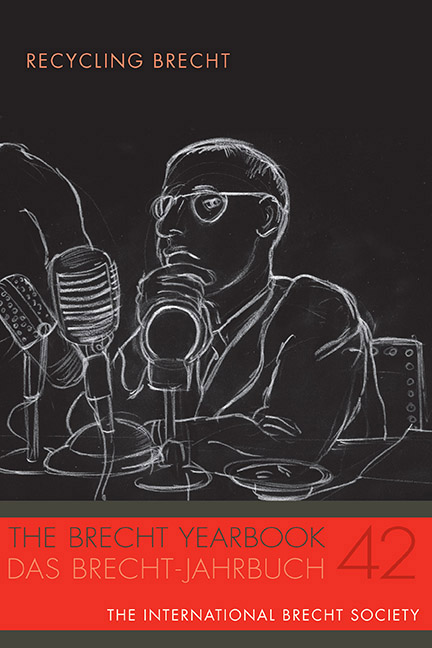Recycling Brecht: Creative Responses
Published online by Cambridge University Press: 09 April 2021
Summary
When we think of the many ways in which Brecht's work, ideas, and texts have been and are being received, refashioned and recycled, we should of course think—and perhaps in the very first place, rather than at the end of this volume—of the use and usefulness of Brecht in the creative arts, in literature, and the theater in the first instance, but not just there: also in film, in multimedia dialogue, in the visual arts, and so on. Brecht himself was a restless experimenter, and many since have been inspired by his experiments to go on and continue that method, in sympathy with or, occasionally, in bitter opposition to Brecht's own spirit. As we have seen, Brecht entertained a lively dialogue with a very wide range of literary and cultural traditions, always weighing up what he could take from them, adapt, and develop. His innovations often come about in the process of recycling the old, for example his “Epic Theater” as a form of reception of the theater of antiquity and of the Early Modern. As a writer, Brecht was of course not only an innovator in the theater, but also opened up new (and old) poetic forms, experimented with subject matters and registers previously thought “unliterary.” He experimented with what were then new media: writing poems to be distributed as records, plays for the radio, and film treatments, and he created his own multimedia and cross-genre works, the photo-epigrams of War Primer, and even made a “Proposal to combine architecture and lyric poetry.” What fruitful territory this is! It is hardly surprising that later artists have taken up the challenge to continue and develop the experiments.
It is less easy for a primarily academic conference to reflect this sort of work in practice. But for the Oxford symposium we were determined also to develop a cultural program, and the pieces that follow are the best we can do by way of traces of all such activity—the work that can at least somehow be represented in linear written form. Some of this work also leaves a more lasting trace, in the form of photographs and filmic accounts, on the website of the Symposium: http://brecht.mml.ox.ac.uk/ibs-symposium. When this is taken down, we hope to transfer at least a proportion of the material to an Oxford University media and research archive and/or to the IBS website.
- Type
- Chapter
- Information
- The Brecht Yearbook / Das Brecht-Jahrbuch 42Recycling Brecht, pp. 199 - 202Publisher: Boydell & BrewerPrint publication year: 2018

